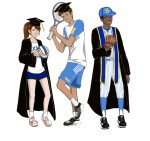The sound of Rachel Butler’s alarm woke her up at 6:30 a.m. sharp every day during spring quarter.
Rather than slamming the snooze button and drifting back to sleep, the junior distance runner would head to Drake Stadium for practice at 7 a.m. Then, she’d quickly return to her apartment for a bite to eat before a full day of class and a possible visit to one of the tutoring sessions that UCLA offers to its student-athletes.
The extra time that she and her fellow student-athletes have devoted to academics seems to have paid off for both the players and UCLA.
Earlier this month, the NCAA released the Academic Progress Rate for all Division I teams between the 2008-2009 and 2011-2012 school years. All 24 of UCLA’s teams qualified for postseason eligibility, with every team earning a score above 950.
The APR measures how student-athletes on scholarship are performing term by term throughout the school year and aims to hold universities accountable for the academic progress of their student-athletes. The APR is a single-team measurement, based off of team members’ eligibility and retention.
Teams’ APR scores are calculated every year and a four-year average is produced, according to the NCAA’s website.
A team’s APR is calculated with a points system. A single student-athlete can earn up to two points for their team, one for staying in school and the other for remaining academically eligible. To remain eligible, student-athletes must complete a certain amount of coursework toward a degree per year, earn at least six credit hours every term and maintain the minimum GPA to graduate, which is a 2.0 for UCLA student-athletes.
The points for all team members are then added up and divided by the total amount of points that the team could have earned. That number is then multiplied by 1,000 to give the team’s APR score. Teams that score below 900 for their four-year average or below 930 in the two most recent years are ruled ineligible for postseason competition.
UCLA teams averaged a score of 976, two points higher than the national average and up four points from a year ago. With a score of 951, men’s basketball had the lowest score of any UCLA team , although it did improve from last year’s score of 942. Two UCLA teams, women’s golf and men’s water polo, scored a perfect 1,000.
“We are fully aware that the strong academic environment at UCLA can pose a great challenge to even the best of students,” said UCLA Athletic Director Dan Guerrero in a statement.
“This achievement is truly a testament to each of our student-athletes, as well as the staff members in our academic support services unit, who year after year have dedicated themselves to ensuring their success.”
Qualifying for eligibility is easier said than done. Student-athletes must juggle the competing demands of school and sports, spending long hours on both the practice field and in tutoring sessions. Then there is also the time they must devote to the sporting event itself, as virtually all UCLA teams play on the weekend, with many, like water polo or track and field, having tournaments that last from Friday to Sunday.
“It’s a huge time commitment,” said Butler, who was recently named to the UCLA All-Academic team for the second time. “When we do travel, we usually leave either Thursday or Friday (and) it’s hard to even think about school when you’re at a meet. Your whole focus should be on competing.”
With travel plans at times conflicting with class hours, UCLA student-athletes must consult their professors or TAs on how to make up work for missed class time. For its part, UCLA offers tutoring for student-athletes to supplement the loss of time in class and ensure they are not falling behind.
“Depending on what class it is, most GEs have tutoring, and a lot of English classes will have individual or group (tutoring),” said Emily Donohoe, a rising junior women’s water polo attacker. “They offer different stuff like that so we can get extra help if we need it, which I have found has helped a lot in the past.”
In May, UCLA held a banquet honoring Butler, Donohoe and 20 other student-athletes who were named to the school’s All-Academic team for having the top GPAs in their individual sports.
Both Butler and Donohoe spoke positively about UCLA’s commitment to helping its student-athletes focus on academics, each stating that they felt the school makes academics a top priority for student-athletes.
“They definitely stress student-first, athlete-second – they want us to excel in both areas,” Donohoe said. “If you need a little extra help, they will provide you with that (because) ultimately you’re here to get an education.”
